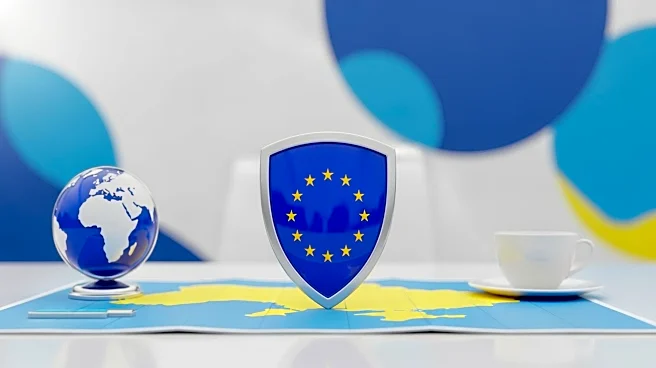What's Happening?
European Union leaders are intensifying their support for Ukraine as concerns grow over a potential meeting between President Trump and Russian President Vladimir Putin. The EU is close to finalizing a 19th
round of economic sanctions aimed at weakening Putin's financial resources and is planning to release €140 billion from Russia's frozen assets to aid Ukraine. This financial support is crucial for Ukraine, which is in its third year of conflict with Russia. The upcoming European Council summit will address these issues, with some EU leaders expressing interest in attending the Trump-Putin meeting to ensure Ukrainian President Volodymyr Zelenskyy is included in any negotiations. Hungarian leader Viktor Orbán, a Trump ally, has maintained good relations with Putin, causing concern among other EU leaders.
Why It's Important?
The EU's actions are significant as they demonstrate a unified stance against Russian aggression and support for Ukraine's sovereignty. The potential Trump-Putin meeting raises fears that President Trump might pressure Ukraine into accepting unfavorable terms, such as ceding territory to Russia. This could undermine Ukraine's position and destabilize the region further. The EU's financial and diplomatic support is crucial in ensuring Ukraine can continue its defense and maintain its territorial integrity. The situation also highlights the geopolitical tensions between Western allies and Russia, with implications for international relations and security.
What's Next?
The European Council summit will likely focus on solidifying the EU's support for Ukraine and discussing strategies to counter any adverse outcomes from the Trump-Putin meeting. EU leaders may push for Zelenskyy's inclusion in the negotiations to safeguard Ukraine's interests. The release of funds from Russia's frozen assets is expected to proceed, providing Ukraine with the necessary resources to sustain its defense efforts. The international community will be closely monitoring the developments, particularly the outcomes of the Trump-Putin discussions, which could have significant implications for the conflict's resolution.
Beyond the Headlines
The situation underscores the complex dynamics of international diplomacy, where alliances and individual leaders' relationships can significantly impact global events. The EU's proactive stance reflects its commitment to upholding democratic values and supporting nations facing aggression. The potential Trump-Putin meeting also raises ethical questions about the influence of personal relationships in diplomatic negotiations and the importance of maintaining a balanced approach to conflict resolution.









